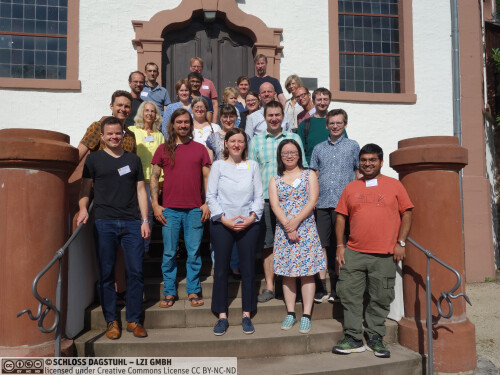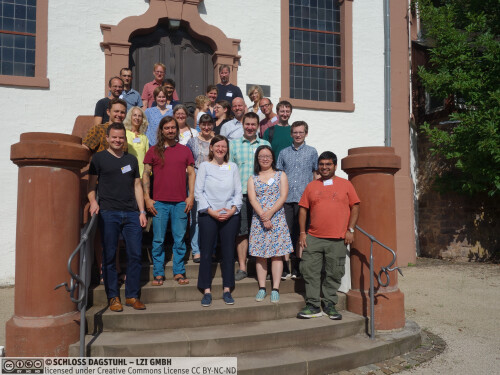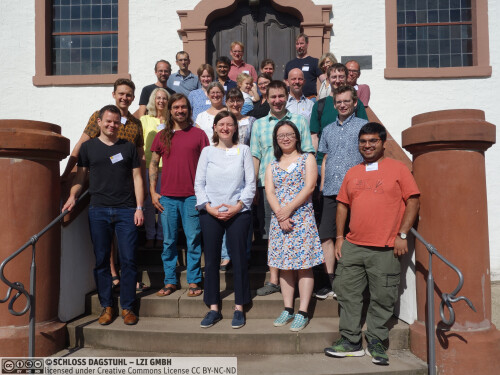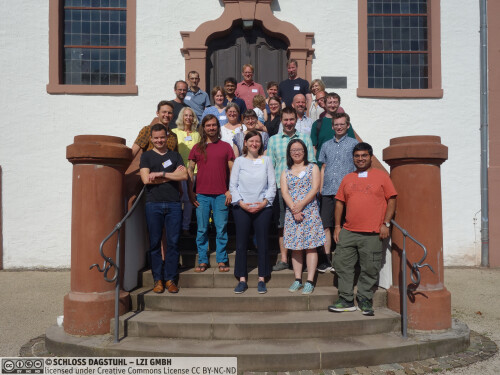Dagstuhl Seminar 23342
Computational Geometry of Earth System Analysis
( Aug 20 – Aug 25, 2023 )
Permalink
Organizers
- Susanne Crewell (Universität Köln, DE)
- Anne Driemel (Universität Bonn, DE)
- Jeff M. Phillips (University of Utah - Salt Lake City, US)
Contact
- Marsha Kleinbauer (for scientific matters)
- Christina Schwarz (for administrative matters)
Schedule
Various disciplines within the Earth sciences deal with measuring and representing the geometry of the Earth’s land and sea surface, as well as atmospheric and oceanic conditions, to further our understanding of dynamic processes occurring on the Earth. All around the world society and economy is becoming more and more vulnerable to changing weather. The recent extreme precipitation and flooding in western Germany and Libya, the strong tornado in the Czech Republic or dry spells leading to severe fires in Canada are just few of many examples which illustrate how anthropogenic climate change is going to influence our weather. Climate describes the statistics of all-weather events and is typically predicted using physical models representing the relevant processes in the Earth system. Understanding these processes is paramount to anticipating and addressing the challenges posed by climate change today. A key aspect of meteorological research and Earth sciences in general is to develop methods to turn atmospheric, oceanic and terrestrial observations into regional information for weather and climate prediction. The observations are being collected with different types of sensors at increasing spatial and temporal resolution which poses computational challenges to meteorologists that cannot always be addressed with traditional methods. More and more observation systems (e.g. from commercial aircraft or new satellite series including radio occultation) but also opportunistic crowd-sourced measurements are currently exploited. In addition, there are ground-based remote-sensing networks for operational atmospheric profiling, which can shed light on small-scale processes such as turbulence and cloud physics that cannot be resolved in detail from satellites, but can be used to improve model parameterizations. Thus, on the horizon there is a wealth of new, voluminous observation systems providing unprecedented possibilities for improving weather and climate models, but require innovative and explorative approaches in the areas of data handling, data assessment, information extraction, and data assimilation. The field of computational geometry is concerned with the design, analysis, and implementation of efficient algorithms for geometric and topological problems, which arise naturally in a wide range of application areas. Computational geometry is a vibrant and mature field of research, with several dedicated international conferences and journals and strong intellectual connections with other computing and mathematics disciplines. Within computer science and mathematics, computational geometry lies in the intersection of the theory of algorithms and combinatorial geometry. Despite its theoretical nature, the research in this field is strongly oriented towards and motivated by concrete practical problems that arise in various application areas that deal with geometric data. The related emerging field of geometric data analysis deals with the efficient statistical analysis of geometric data by providing sketches and data summaries with provable guarantees.
Outcome
This Dagstuhl Seminar brought together 26 researchers from the fields computational geometry and the Earth sciences to provide a forum to discuss the unique computational challenges that need to be dealt with and how the geometry underlying the input data can be exploited to obtain efficient algorithms. The 5-day seminar was initially focused on three problem areas (1) data assimilation of weather-related measurements for numerical simulation, (2) tracking and clustering of moving atmospheric features, and (3) the planning and optimization of sensor placements. In addition to these topics, seminar participants contributed research questions from the current state of the art in their fields. There were 13 research talks throughout the seminar. Several longer talks gave an overview over the proposed seminar topics, either from the point of view of Earth scientists or from the point of view of algorithmic techniques. Organized group discussions resulted in several breakout groups on emerging topics. Each group was composed of a mix of participants from the different fields. In addition, the program left ample room for discussions and for new research directions to emerge.
The seminar was seen as a success by organizers and participants. This is nicely summarized by a quote from the survey:
"This seminar brought together a highly motivated group of excellent researchers. It felt as if all of them wanted to make the best use of this seminar to make a difference, in an interdisciplinary application domain. Since this was an interdisciplinary seminar, there was certainly a natural spread in terms of how willing people were to learn about new topics and/or to (re-)explain their work/ideas to researchers from other fields. However, overall this worked well and the atmosphere stimulated new ideas and interdisciplinary exchange."
 Anne Driemel, Susanne Crewell, and Jeff M. Phillips
Anne Driemel, Susanne Crewell, and Jeff M. Phillips
Various disciplines within the Earth sciences deal with measuring and representing the geometry of Earth’s land and sea surface, as well as atmospheric and oceanic conditions, to further our understanding of dynamic processes occurring on Earth.
All around the world, society and economy is becoming more and more vulnerable to changing weather. The recent extreme precipitation and flooding in western Germany and South Africa, the strong tornado in the Czech Republic, or dry spells leading to severe fires in Canada are just a few of many examples that illustrate how anthropogenic climate change is going to influence our weather. Climate describes the statistics of all-weather events and is typically predicted using physical models representing the relevant processes in the Earth system. Understanding these processes is paramount to anticipating and addressing the challenges posed by climate change today.
A key aspect of meteorological research and Earth sciences in general is to develop methods to turn atmospheric, oceanic, and terrestrial observations into regional information for weather and climate prediction. The observations are being collected with different types of sensors at increasing spatial and temporal resolution which poses computational challenges to meteorologists that cannot always be addressed with traditional methods. More and more observation systems (e.g., from commercial aircraft or new satellite series including radio occultation) but also opportunistic crowd-sourced measurements are currently exploited. In addition, there are ground-based remote-sensing networks for operational atmospheric profiling, which can shed light on small-scale processes such as turbulence and cloud physics that cannot be resolved in detail from satellites, but can be used to improve model parameterizations. Thus, on the horizon there is a wealth of new, voluminous observation systems providing unprecedented possibilities for improving weather and climate models through innovative and explorative approaches in the areas of data handling, data assessment, information extraction, and data assimilation.
The field of computational geometry is concerned with the design, analysis, and implementation of efficient algorithms for geometric and topological problems, which arise naturally in a wide range of application areas. Computational geometry is a vibrant and mature field of research, with several dedicated international conferences and journals and strong intellectual connections with other computing and mathematics disciplines. Within computer science and mathematics, computational geometry lies in the intersection of the theory of algorithms and combinatorial geometry. Despite its theoretical nature, the research in this field is strongly oriented towards and motivated by concrete practical problems that arise in various application areas that deal with geometric data. The related emerging field of geometric data analysis deals with the efficient statistical analysis of geometric data by providing sketches and data summaries with provable guarantees.
This Dagstuhl Seminar will bring together computational geometers and meteorologists and will provide a forum to discuss the unique computational challenges that meteorologists are dealing with and how the geometry underlying the input data can be exploited to obtain efficient algorithms. Concrete problem areas that could greatly benefit from synergies between the two research areas include (1) data assimilation of weather-related measurements for numerical simulation, (2) tracking and clustering of moving atmospheric features, and (3) the planning and optimization of sensor placements.
 Susanne Crewell, Anne Driemel, and Jeff M. Phillips
Susanne Crewell, Anne Driemel, and Jeff M. Phillips
- Mikkel Abrahamsen (University of Copenhagen, DK) [dblp]
- Kevin Buchin (TU Dortmund, DE) [dblp]
- Maike Buchin (Ruhr-Universität Bochum, DE) [dblp]
- Dwaipayan Chatterjee (Universität Köln, DE)
- Susanne Crewell (Universität Köln, DE) [dblp]
- Anne Driemel (Universität Bonn, DE) [dblp]
- Peter Dueben (ECMWF - Bonn, DE) [dblp]
- Sándor Fekete (TU Braunschweig, DE) [dblp]
- Franziska Glassmeier (TU Delft, NL)
- Siddharth Gupta (University of Warwick - Coventry, GB) [dblp]
- Jan-Henrik Haunert (Universität Bonn, DE) [dblp]
- Stefan Kollet (Forschungszentrum Jülich, DE) [dblp]
- Jürgen Kusche (Universität Bonn, DE) [dblp]
- Petra Mutzel (Universität Bonn, DE) [dblp]
- Peer Nowack (KIT - Karlsruher Institut für Technologie, DE)
- André Nusser (University of Copenhagen, DK) [dblp]
- Jeff M. Phillips (University of Utah - Salt Lake City, US) [dblp]
- Benjamin Raichel (University of Texas at Dallas - Richardson, US) [dblp]
- Vera Schemann (Universität Köln, DE) [dblp]
- Melanie Schmidt (Heinrich-Heine-Universität Düsseldorf, DE) [dblp]
- Christian Sohler (Universität Köln, DE) [dblp]
- Frank Staals (Utrecht University, NL) [dblp]
- Nikki Vercauteren (University of Oslo, NO) [dblp]
- Bei Wang Phillips (University of Utah - Salt Lake City, US) [dblp]
Classification
- Computational Geometry
- Data Structures and Algorithms
Keywords
- efficient algorithms
- geometric algorithms
- event detection
- interpolation methods
- sensor placement





 Creative Commons BY 4.0
Creative Commons BY 4.0
